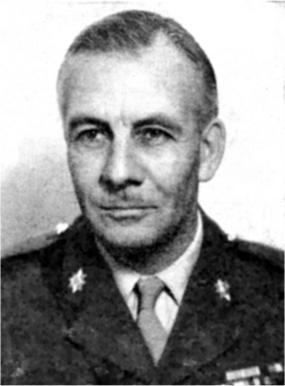Lieut.-Colonel St. John Carslake BROOKE-JOHNSON, O.B.E., M.B.E. (177691)
Commanded the Depot Worcestershire Regiment from November 1966 to January 1970.
After enlisting from Trinity College, Oxford, as a private soldier into the Queen's Royal Regiment on 10th August, 1940, he was an Officer Cadet of the Honourable Artillery Company at Bulford, from which he was commissioned into The Worcestershire Regiment on 15th March, 1941, and posted to the 11th Battalion, first under Lt.-Colonel C. V. W. Court and then under Lt.-Colonel J. T. Milner. Between 1941 and 1943 he served successively as a Platoon Commander in 1st Battalion D.C.L.I. in North Africa, as Intelligence Officer to 1st Battalion The King Own Royal Regiment (which he also represented at boxing), and then with 1st Special Air Service Regiment in North Africa. He carried out sabotage operations behind the enemy lines until February 1943, when, as a member of Lieut.-Colonel David Stirling's group, he was captured near Gabes, Southern Tunisia, by the German 90th Light Division and and sent to a POW camp in Italy. From February, 1943, to May, 1945, he was a prisoner of war, first in Italy from which he escaped and joined the North Italy partisans, until re-captured by the German 1st S.S. Regiment near Trento. He was sent to Germany as a prisoner and escaped again in September, 1944, but was again re-captured owing to his escape route taking him into the middle of the Battle of Arnhem! He was involved in 12 attempts to escape while a prisoner, of which 9 were frustrated before he could get beyond the wire. The most successful of his 3 break-outs was in September 1944 when he walked out of Rotenburg Camp in Germany in a party of seven, all of whom were disguised as members of a British Other Rank working party, complete with handcart and picks. Once free they split up, and his party, which made for the Dutch border, evaded capture for 12 days before being arrested in an area he was later to get to know well as the Sennelager Training Area. His MBE which was gazetted in 1947 was awarded for his skilful and daring escape activities. In July 1945 he served in 9th Battalion The Worcestershire Regiment (Lieut.-Colonel D. H. Nott) at Ashford, Kent. |
Lieut.-Col. St. J. C. Brooke-Johnson |
In November 1945 he joined the 1st Battalion Worcestershire Regiment at Goslar, Germany and shortly afterwards became Brigade IO (Intelligence Officer) in the 13 Infantry Brigade, B.A.O.R., at Goslar, Hildesheim, Northeim, and then in C.M.F. at Trieste and Pola.
In January 1948, he returned to 1st Battalion The Worcestershire Regiment in Berlin (Lieut.-Colonel R. E. L. Tuckey) and Gottingen B.A.O.R., Chester and Malaya (Lieut.-Colonel A. H. Gillmore), being Battalion Adjutant from December 1948 to December 1950.
After 6 months as Intelligence Officer to 18 Infantry Brigade (Brigadier R. T. K. Pye, late Sherwood Foresters) in Selangor, Malaya, he returned to 1st Battalion The Worcestershire Regiment (Lieut.-Colonel P. H. Graves-Morris) as O.C. 'B' Company at Kuala Selangor and Penang, during which time he visited Sarawak where he looked up Awang Anak Rawang, G.C., in his longhouse.
In October 1952, he was mentioned in despatches.
On return to U.K. in 1952 he was successively Training Officer at Eaton Hall Officer Cadet School (Commandant Lieut.-Colonel D. H. Nott), O.C. Training Company, The Depot, Norton Barracks (Major A. H. Nott).
He attended courses at the Staff College, Camberley, and the Royal Military College of Science, Shrivenham the Staff College in 1955 and his staff appointments as a major were in Hong Kong and MO3 in The War Office, and as a Lieut.- Colonel at HQ AFSOUTH in Naples.
From June 1956, to June 1958, he was G.S.O.2 (Ops.) H.Q. Land Forces, Hong Kong, following which he again returned to the 1st Battalion where he was Company Commander of 'B' Company in British Honduras, West Indies (under Lieut.-Colonel T. F. Hughes), and at Norton Barracks (under Lieut.-Colonel J. W. B. Stuart).
After 2 years at the War Office he was appointed 2 I.C. of 1st Battalion The Worcestershire Regiment (Lieut.-Colonel P. G. B. Hall) at Norton Barracks (Worcester) and in B.A.O.R. (Minden). In April 1964, he was promoted Lt.-Colonel and appointed Commanding Officer of Mercian Brigade Depot, Lichfield, which he commanded most successfully for the next 2½ years. From November, 1966, to January, 1970, he was successively G.S.O.1 (Ops.) and then G.S.O.1 (Plans), H.Q. Allied Forces Southern Europe, Naples, and C-in-C's representative of the U.S./Turkish Task Force, Eastern Turkey, and Defence Studies in Greece and Turkey.
At sport he represented The Worcestershire Regiment at Rugger, Squash and, somewhat spasmodically, at Cricket! But perhaps his most noteworthy sporting successes were at riding, at which he won the 13 Infantry Brigade Novices' Hunter Trials in 1947, collected two seconds at Hanover Races the same year, won the 31 Infantry Brigade Open Jumping in 1945, and represented Penang once at Polo.
Lieut.-Colonel Brooke-Johnson, retired from the Regiment and the Army after just on 30 years total service on 22nd April 1970.
On retiring from the Army he worked for the Lord Mayor of London for 17 years for which he was appointed O.B.E. and he was subsequently heavily involved in charitable work until his death.
Lieut.- Colonel St J. C. Brooke Johnson died at Richmond, Surrey, on 18th September 1996, aged 75.

German Police Report which details the escape from POW Camp at Rotenburg on the 24th September 1944.
Brooke-Johnson escaped with 6 other British Officers. However, he was re-captured 12 days later near Sennelager.
(Document supplied by John Jay)

